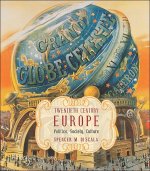
Twentieth Century Europe: Politics, Society, Culture (McGraw-Hill, 2004)
While teaching his course on twentieth century Europe, Di Scala discovered that similar problems to those that existed with regard to Italy were prevalent with regard to modern Europe. While more general histories were available on the topic, he did not find any of them satisfactory. For example, in his opinion, no book comprehensively covered the vital role of science or the role and contributions of the smaller European countries in European or world history over the entire twentieth century. In addition, he felt, they were overly influenced by a Cold War mentality and did not adequately consider longer-term events. He therefore decided to write his own work.
This book views the twentieth century not as a “short” century but as a “long” one. It is the first book to look at the history of the century from a post-Cold War perspective, taking a broader view of the century than simply the struggle between communism and capitalism. The book examines the increasingly important role of science and technology in European history, from the revolution in physics to the one in biology. It places special emphasis on the smaller countries of Europe, examining all of them in detail to demonstrate their practical influence in economics, politics, society, and science. The book’s new examination of the twentieth century rests on the premise that a full explanation of an event must provide historical context—twentieth century events may be influenced by facts dating from the nineteenth century or earlier. The work strikes a balance among political, social, and cultural history, with special attention paid to demonstrating the relevance of twentieth century history to the present.
The book includes two biographical sketches in each chapter to profile individuals prominent during the time period covered and their lives as a whole. An annotated bibliographical essay in each chapter allows readers to expand on the issues discussed and gives an idea of the arguments confronted by the books cited in the bibliography.
Praise for Twentieth Century Europe
“Without a doubt, the greatest strength of Twentieth Century Europe is the perspective…it is the only textbook that views the twentieth century from the post-Cold War angle. The years after 1945 are not treated as some kind of afterthought.” —Ronald J. Ross, University of Wisconsin, Milwaukee
“I believe that a strength of this text that does not appear in other texts is the coverage of the smaller countries. Spencer Di Scala follows this through from the end of the nineteenth century to the present, and it is very effective.” —Alexander De Grand, North Carolina State University
